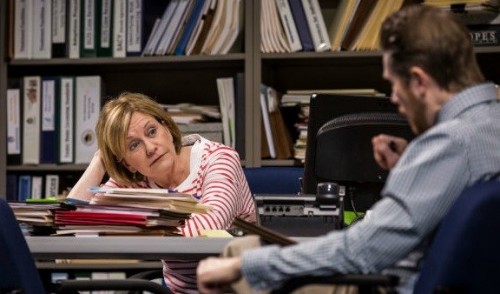Robert Falls Directs Luna Gale
The Material Triumphs in Rebecca Gilman's New Play
By: Susan Hall - Feb 03, 2014
Luna Gale
By Rebecca Gilman
Directed by Robert Falls
Cast: Reyna de Courcy (Karlie),), Colin Sphar (Peter, Mary Beth Fisher (Caroline), Robert Thieriot (Pastor Jay), Jordan Baker (Cindy), Melissa DuPrey (Lourdes), Eric Hellman (Cliff).
Production:Todd Rosenthal (Sets), Robert Wierzel (Lighting), Robert Woodbury (Sound).
Goodman Theatre
Chicago, Illinois
Thru February 23, 2014
Luna Gale by Rebecca Gilman is mounted at the Goodman Theatre in Chicago with its usual style and punch. Todd Rosenthal’s set perfectly captures the multiple dramas which unfold in this Human Service case. A mother’s home, her child’s, an emergency room and a social service's office and lunch room open on a turntable and are separated by the brilliant lighting of Robert Wierzel.
Each room’s detail provides an opportunity for the director, Robert Falls, to emphasize the thrust of a scene. The most amusing one presents a social worker and a young father seated at children’s tables, knees knocking their noses as they execute a document.
While good humor abounds, this is a very serious theatrical work. Emphasis in the United States and around the world on the abuses of the Catholic clergy take our eyes off a critical, and in some ways more elusive, problem of abuse in family quarters.
Playwright Gilman’s pen is unyielding as she probes the causes and consequences of this issue.
Remarkable acting gives credibility to the drama unfolding on stage. Particularly brilliant turns by two of the least likeable characters help us empathize.
Robert Thieriot plays a pastor who is a cross between Jim Jones and Robert H. Schuller. He is more concerned with gathering new members into the flock than with the well-being a individual humans. The pastor is particularly repulsive. And yet when he prays with an unlikely recipient of a blessing, even if you are agnostic, you want to pray with him.
The pastor lavishes attention on his convert Cindy, whose escape from the real world’s real problems is conveyed brilliantly by Jordan Baker. The chaos her teenage daughter has created will be solved when Cindy adopts her grandchild, Luna Gale, and brings her into the pastor’s flock.
But this is not what the baby’s drug addicted mother wants, and it is the damaged teen's profoundly maternal sacrifice that sets the little Luna Gale on a hopeful course.
The play opens with a teen couple high on methamphetamines. The father, Colin Sphar (Peter), is zonked. Skittles and other candies fly around the waiting room as Reyna de Courcy, inhabiting the role of Karlie, compulsively taps both feet. She is waiting to get a report on her infant daughter Luna who is suffering from dehydration and diarrhea.
Melissa DuPrey is particularly moving as Lourdes, a parallel case to Luna’s. Lourdes is aging out of the system. While policy makers are forced to put cut off dates on delivery of services, arbitrary terminations can be particularly cruel in the foster care system. Circumstances beyond a child’s control leave them chronologically aged out and psychologically unequipped to deal with the outside world. The consequences of these policies are etched in the soul by DuPrey.
At the heart of the play is Caroline, a social worker, burned out by a job she has held for twenty-five years. I have taught teens in the foster care system for over a decade and know its workings well.
Caroline simply does not ring true. She puts people off and holds them at bay. We are given a partial explanation in a confessional. The revelation scene is not credible. Workers are taught to use their personal experience to empathize, but they are also taught to keep their problems and histories to themselves.
Of course social workers and other support personnel become cynical and jaundiced. The ambitious Cliff, enlivened by Eric Hellman, takes the first opportunity offered to exit the system. What is surprising is the number of committed workers who opt in after years of caring deeply and effecting only small changes.
Faced with a child in pain acting out, these men and women respond as though the child were their own. They honor their trust role and, no matter how frustrating the system, or how many roadblocks are erected by foolish laws and lack of funds, they try to get a young person on a path to a successful life.
Because a child’s problems begin with tragedies at home, in the best of all possible worlds, they should never enter the public sphere. We as a decent society have elected to keep children minimally safe. Intervention is important but it brings outsiders to the family drama. As outsiders social workers and other aides are humbled by their role. They recognize the limitations of their insights. Public intervention is at best an imperfect solution. Caroline does not convey this conundrum.
Playwright Gilman well understands that there are no pat answers. Rehab facilities might benefit the young couple, Karlie and Peter, but they are jam packed and wait lists are long.
The guiding mantras change often. ‘Family reunification’ is one mantra lofted as a solution. But family reunification is problematic when abuse has taken place at home. In the play, giving baby Luna to her grandmother will cut Luna off from her mother, who hates her own mother.
The solution offered in Luna Gale is a profoundly maternal act by a teen age mother. Her choice offers some comfort at the play's conclusion.
Luna Gale is the first of a series of plays by women produced by the Goodman this season. Despite some flaws in conception, Luna Gale is a provocative play, wonderfully staged and performed.




